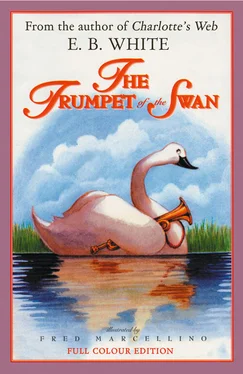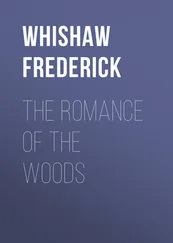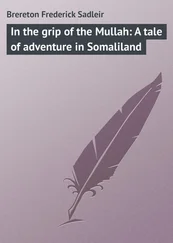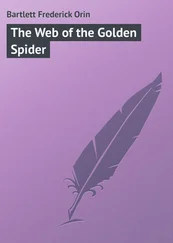After supper that evening, Sam and his father sat for a while on the porch. Sam was reading a bird book.
“Pop,” said Sam, “do you think we’ll be coming back to camp again about a month from now—I mean, in about thirty-five days or something like that?”
“I guess so,” replied Mr. Beaver. “I certainly hope so. But why thirty-five days? What’s so special about thirty-five days?”
“Oh, nothing,” said Sam. “I just thought it might be very nice around here in thirty-five days.”
“That’s the craziest thing I ever heard of,” said Mr. Beaver. “It’s nice here all the time.”
Sam went indoors. He knew a lot about birds, and he knew it would take a swan about thirty-five days to hatch her eggs. He hoped he could be at the pond to see the young ones when they came out of the eggs.
Sam kept a diary—a daybook about his life. It was just a cheap notebook that was always by his bed. Every night, before he turned in, he would write in the book. He wrote about things he had done, things he had seen, and thoughts he had had. Sometimes he drew a picture. He always ended by asking himself a question so he would have something to think about while falling asleep. On the day he found the swan’s nest, this is what Sam wrote in his diary:
I saw a pair of trumpeter swans today on a small pond east of camp. The female has a nest with eggs in it. I saw three, but I’m going to put four in the picture—I think she was laying another one. This is the greatest discovery I ever made in my entire life. I did not tell Pop. My bird book says baby swans are called cygnets. I am going back tomorrow to visit the great swans again. I heard a fox bark today. Why does a fox bark? Is it because he is mad, or worried, or hungry, or because he is sending a message to another fox? Why does a fox bark?
Sam closed his notebook, undressed, crawled into his bunk, and lay there with his eyes closed, wondering why a fox barks. In a few minutes he was asleep.
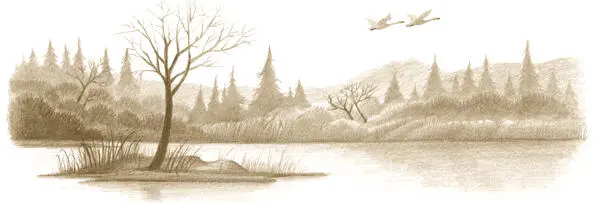
THE POND Sam had discovered on that spring morning was seldom visited by any human being. All winter, snow had covered the ice; the pond lay cold and still under its white blanket. Most of the time there wasn’t a sound to be heard. The frog was asleep. The chipmunk was asleep. Occasionally a jay would cry out. And sometimes at night the fox would bark—a high, rasping bark. Winter seemed to last forever.
But one day a change came over the woods and the pond. Warm air, soft and kind, blew through the trees. The ice, which had softened during the night, began to melt. Patches of open water appeared. All the creatures that lived in the pond and in the woods were glad to feel the warmth. They heard and felt the breath of spring, and they stirred with new life and hope. There was a good, new smell in the air, a smell of earth waking after its long sleep. The frog, buried in the mud at the bottom of the pond, knew that spring was here. The chickadee knew and was delighted (almost everything delights a chickadee). The vixen, dozing in her den, knew she would soon have cubs. Every creature knew that a better, easier time was at hand—warmer days, pleasanter nights. Trees were putting out green buds; the buds were swelling. Birds began arriving from the south. A pair of ducks flew in. The Red-winged Blackbird arrived and scouted the pond for nesting sites. A small sparrow with a white throat arrived and sang, “Oh, sweet Canada, Canada, Canada!”
And if you had been sitting by the pond on that first warm day of spring, suddenly, toward the end of the afternoon, you would have heard a stirring sound high above you in the air—a sound like the sound of trumpets.
“Ko-hoh, ko-hoh!”
And if you had looked up, you would have seen, high overhead, two great white birds. They flew swiftly, their legs stretched out straight behind, their long white necks stretched out ahead, their powerful wings beating steady and strong. “Ko-hoh, ko-hoh, ko-hoh!” A thrilling noise in the sky, the trumpeting of swans.
When the birds spotted the pond, they began circling, looking the place over from the air. Then they glided down and came to rest in the water, folding their long wings neatly along their sides and turning their heads this way and that to study their new surroundings. They were Trumpeter Swans, pure white birds with black bills. They had liked the looks of the swampy pond and had decided to make it their home for a while and raise a family.
The two swans were tired from the long flight. They were glad to be down out of the sky. They paddled slowly about and then began feeding, thrusting their necks into the shallow water and pulling roots and plants from the bottom. Everything about the swans was white except their bills and their feet; these were black. They carried their heads high. The pond seemed a different place because of their arrival.
For the next few days, the swans rested. When they were hungry, they ate. When they were thirsty—which was a great deal of the time—they drank. On the tenth day, the female began looking around to find a place to build her nest.
In the spring of the year, nest-building is uppermost in a bird’s mind: it is the most important thing there is. If she picks a good place, she stands a good chance of hatching her eggs and rearing her young. If she picks a poor place, she may fail to raise a family. The female swan knew this; she knew the decision she was making was extremely important.
The two swans first investigated the upper end of the pond, where a stream flowed slowly in. It was pleasant there, with reeds and bulrushes. Red-winged Blackbirds were busy nesting in this part of the pond, and a pair of Mallard Ducks were courting. Then the swans swam to the lower end of the pond, a marsh with woods on one side and a deer meadow on the other. It was lonely here. From one shore, a point of land extended out into the pond. It was a sandy strip, like a little peninsula. And at the tip of it, a few feet out into the water, was a tiny island, hardly bigger than a dining table. One small tree grew on the island, and there were rocks and ferns and grasses.
“Take a look at this!” exclaimed the female, as she swam round and around.
“Ko-hoh!” replied her husband, who liked to have someone ask his advice.
The swan stepped cautiously out on to the island. The spot seemed made to order—just right for a nesting place. While the male swan floated close by, watching, she snooped about until she found a pleasant spot on the ground. She sat down, to see how it felt to be sitting there. She decided it was the right size for her body. It was nicely located, a couple of feet from the water’s edge. Very convenient. She turned to her husband.
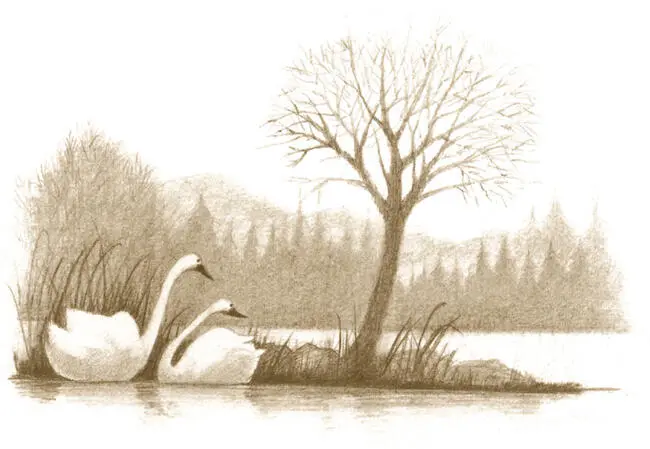
“What do you think?” she said.
“An ideal location!” he replied. “A perfect place! And I will tell you why it’s a perfect place,” he continued, majestically. “If an enemy—a fox or a coon or a coyote or a skunk—wanted to reach this spot with murder in his heart, he’d have to enter the water and get wet. And before he could enter the water, he’d have to walk the whole length of that point of land. And by that time we’d see him or hear him, and I would give him a hard time.”
The male stretched out his great wings, eight feet from tip to tip, and gave the water a mighty clout to show his strength. This made him feel better right away. When a Trumpeter Swan hits an enemy with his wing, it is like being hit by a baseball bat. A male swan, by the way, is called a “cob.” No one knows why, but that’s what he’s called. A good many animals have special names: a male goose is called a gander, a male cow is called a bull, a male sheep is called a ram, a male chicken is called a rooster, and so on. Anyway, the thing to remember is that a male swan is called a cob.
Читать дальше
